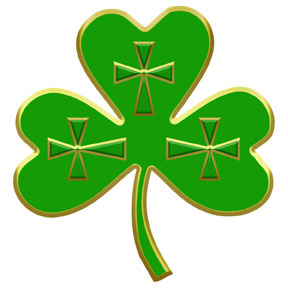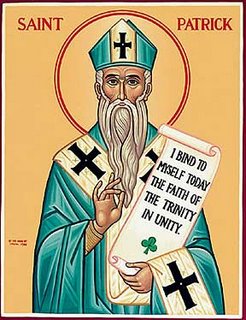Spurred up the rocks with a warning cry;
"Arm! Arm!" he cried, "for I've come to lead you,For Ireland's freedom we fight or die." ~ Irish Folk Song (Author unknown)

Today we celebrate St. Patrick's day, a day traditionally celebrated by consuming massive quantities of alcohol along with generous helpings of corned beef and boiled cabbage. Today, as we say, we are all Irish. Ireland and St Patrick share a rich tradition and history. It is a tradition that any free thinking, freedom minded American can appreciate. Ireland, like America, was once ruled by the British Monarchy, and, like America, had to fight for its eventual freedom.
My heritage is Scottish, and the Scots too, share a common bond with Ireland. In many ways, Ireland symbolizes the sheer determination that it takes to free oneself from the yoke of oppression, And Saint Patrick's tumultuous life mirrors the struggle that created such a strong and independent people.
I found the following Bio of Saint Patrick. It is long but well worth the read:
The Life of Saint Patrick
The Patron Saint of Ireland was born into either a Scottish or English family in the fourth century. He was captured as a teenager by Niall of the Nine Hostages who was to become a King of all Ireland.
He was sold into slavery in Ireland and put to work as a shepherd. He worked in terrible conditions for six years drawing comfort in the Christian faith that so many of his people had abandoned under Roman rule.

Patrick had a dream that encouraged him to flee his captivity and to head South where a ship was to be waiting for him. He travelled over 200 miles from his Northern captivity to Wexford town where, sure enough, a ship was waiting to enable his escape.
Upon arrival in England he was captured by brigands and returned to slavery. He escaped after two months and spent the next seven years travelling Europe seeking his destiny.
During this time he furthered his education and studied Christianity in the Lerin Monastery in France. He returned to England as a priest. Again a dream greatly influenced him when he became convinced that the Irish people were calling out to him to return to the land of his servitude.
He went to the Monastery in Auxerre where it was decided that a mission should be sent to Ireland. Patrick was not selected for this task to his great disappointment. The monk that was selected was called Paladius, but he died before he could reach Ireland and a second mission was decided upon.
Patrick was made a Bishop by Pope Celestine in the year 432 and, together with a small band of followers, travelled to Ireland to commence the conversion.
Patrick confronted the most powerful man in Ireland, Laoghaire, The High King of Tara as he knew that if he could gain his support that he would be safe to spread the word throughout Ireland. To get his attention Patrick and his followers lit a huge fire to mark the commencement of Spring. Tradition had it that no fire was to be lit until the Kings fire was complete, but Patrick defied this rule and courted the confrontation with the King.
The King rushed into action and travelled with the intention of making war on the holy delegation. Patrick calmed the King and with quiet composure impressed the King that he had no other intention than that of spreading the word of the Gospel. The King accepted the missionary, much to the dismay of the Druids who feared for their own power and position in the face of this new threat. They commanded that he make snow fall. Patrick declined to do so stating that this was Gods work. Immediately it began to snow, only stopping when Patrick blessed himself.
Still trying to convince the King of his religion Patrick grasped at some Shamrock growing on the ground. He explained that there was but one stem on the plant, but three branches of the leaf, representing thblesseded Trinity. The King was impressed with his sincerity and granted him permission to spread the word of his faith, although he did not convert to Christianity himself.
Patrick and his followers were free to spread their faith throughout Ireland and did so to great effect. He drove paganism (symbolised by the snake) from the lands of Eireann.
Patrick was tempted by the Devil whilst on a pilgrimage at Croagh Patrick. For his refusal to be tempted, God rewarded him with a wish. Patrick asked that the Irish be spared the horror of Judgement Day and that he himself be allowed to judge his flock. Thus, the legend that Ireland will disappear under a sea of water seven years before the final judgement, was born.
Patrick died on March 17th in the year 461 at the age of 76. It is not known for sure where his remains were laid although Downpatrick in County Down in the North of Ireland is thought to be his final resting place.
His influence is still felt to this day as Nations the world over commemorate him on March 17th of every year.
The Irish National Anthem
The Soldier's Song is the National Anthem of Ireland. It was written in 1907 by Peadar Kearney, but was not widely known until it was sung both at the GPO during the Easter Rising of 1916 and later at various camps where Republicans were interned. Soon after, it was adopted as the Irish National Anthem, replacing God Save Ireland. The second and third verses are hardly ever sung, just as we Americans rarely sing the 2nd and 3rd verses of our own national Anthem. In fact the chorus itself is sometimes sung on it's own.
Listen to the chorus here.
A Soldier's Song
We'll sing a song, a soldier's song,
With cheering rousing chorus,
As round our blazing fires we throng,
The starry heavens o'er us;
Impatient for the coming fight,
And as we wait the morning's light,
Here in the silence of the night,
We'll chant a soldier's song.
Chorus:
Soldiers are we , whose lives are pledged to Ireland;
Some have come from a land beyond the wave.
Sworn to be free, No more our ancient sire land
Shall shelter the despot or the slave.
Tonight we man the gap of danger
In Erin's cause, come woe or weal
'Mid cannons' roar and rifles peal,
We'll chant a soldier's song.
In valley green, on towering crag,
Our fathers fought before us,
And conquered 'neath the same old flag
That's proudly floating o'er us.
We're children of a fighting race,
That never yet has known disgrace,
And as we march, the foe to face,
We'll chant a soldier's song.
Chorus :
Sons of the Gael! Men of the Pale!
The long watched day is breaking;
The serried ranks of Inisfail
Shall set the Tyrant quaking.
Our camp fires now are burning low;
See in the east a silv'ry glow,
Out yonder waits the Saxon foe,
So chant a soldier's song.





4 comments:
Happy Saint Patrick's Day, Mark and Company!
The best thing about the Irish is they are one people who do NOT resent being stereotyped. They're manly men.
I agree, LR. They are manly men indeed. I used to have a roomate named Jimmy McDonough who was 100% Irish. Not a speck of any other kind of blood in him. He was also a proud Democrat that had worked on the McGovern campaign, but I digress.
Jimmy used to tell me, proudly, that Ireland had the lowest percntage of gays and lesbians if any country in the world. I don't know how to check that statistic, so I don't know how true it is, but it wouldn't surprise me one bit of it wasn't pretty close to true. I think Scots would rank somewhere around there, also.
He also said England had the highest percentage, which is believable, too.
Mark, sorry to rain on your Guinness-sponsored parade but, while I appreciate the sentiment about Celtic determination and all, I take exception to your praising their struggles to throw off the oppressive yolk of the British Monarchy. Could I just point out that for most of the last century those ‘struggles’ consisted of committing terrorist acts against both Irish and British civilians and officials.
Also, your linking of Irish and Scottish peoples in their ‘struggles’ is curious, as England did not conquer Scotland – quite the reverse; the Scottish King inheriting the English Crown is what eventually lead to the Act of Union; the English were actually taken over by Scotland! Unlike its Irish equivalents though, the SNP never promoted a terrorist agenda but rather stuck to the political process and, sure enough, today there is devolution and a Scottish Parliament while in Ireland they are still trying to get past the past and re-establish a workable democratic forum.
Post a Comment